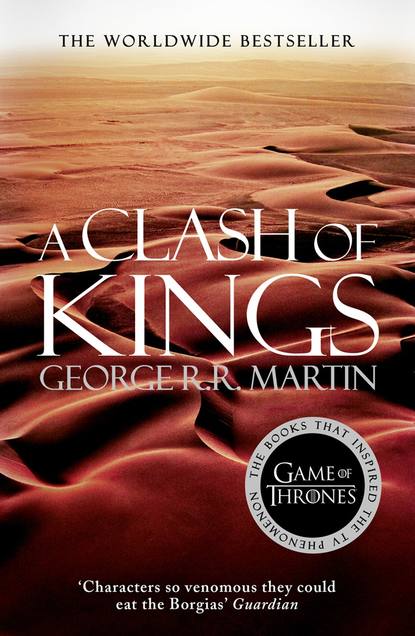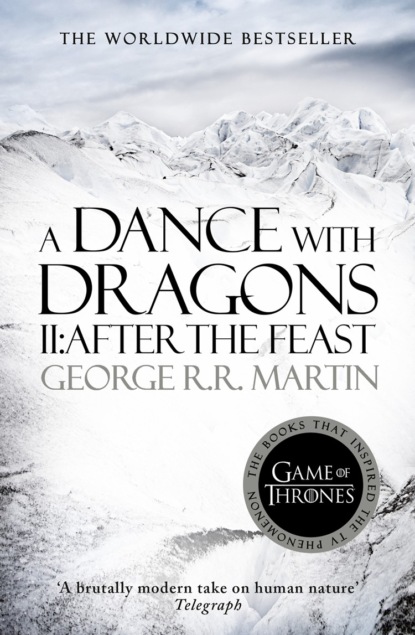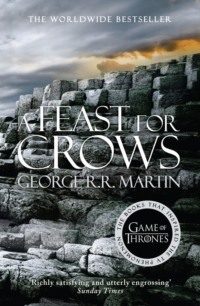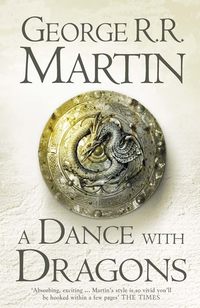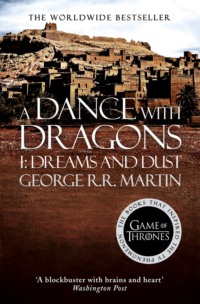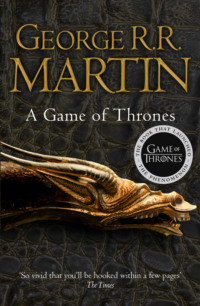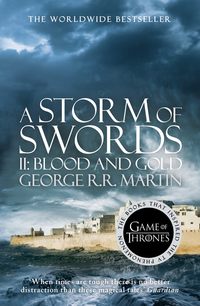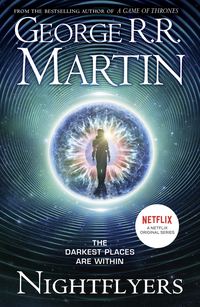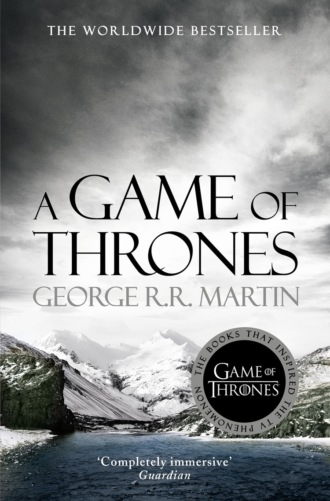
Полная версия
A Game of Thrones
But the man they found bound hand and foot to the holdfast wall awaiting the king’s justice was old and scrawny, not much taller than Robb. He had lost both ears and a finger to frostbite, and he dressed all in black, the same as a brother of the Night’s Watch, except that his furs were ragged and greasy.
The breath of man and horse mingled, steaming, in the cold morning air as his lord father had the man cut down from the wall and dragged before them. Robb and Jon sat tall and still on their horses, with Bran between them on his pony, trying to seem older than seven, trying to pretend that he’d seen all this before. A faint wind blew through the holdfast gate. Over their heads flapped the banner of the Starks of Winterfell: a grey direwolf racing across an ice-white field.
Bran’s father sat solemnly on his horse, long brown hair stirring in the wind. His closely trimmed beard was shot with white, making him look older than his thirty-five years. He had a grim cast to his grey eyes this day, and he seemed not at all the man who would sit before the fire in the evening and talk softly of the age of heroes and the children of the forest. He had taken off Father’s face, Bran thought, and donned the face of Lord Stark of Winterfell.
There were questions asked and answers given there in the chill of morning, but afterward Bran could not recall much of what had been said. Finally, his lord father gave a command, and two of his guardsmen dragged the ragged man to the ironwood stump in the center of the square. They forced his head down onto the hard black wood. Lord Eddard Stark dismounted and his ward Theon Greyjoy brought forth the sword. “Ice,” that sword was called. It was as wide across as a man’s hand, and taller even than Robb. The blade was Valyrian steel, spell-forged and dark as smoke. Nothing held an edge like Valyrian steel.
His father peeled off his gloves and handed them to Jory Cassel, the captain of his household guard. He took hold of Ice with both hands and said, “In the name of Robert of the House Baratheon, the First of his Name, King of the Andals and the Rhoynar and the First Men, Lord of the Seven Kingdoms and Protector of the Realm, by the word of Eddard of the House Stark, Lord of Winterfell and Warden of the North, I do sentence you to die.” He lifted the greatsword high above his head.
Bran’s bastard brother Jon Snow moved closer. “Keep the pony well in hand,” he whispered. “And don’t look away. Father will know if you do.”
Bran kept his pony well in hand, and did not look away.
His father took off the man’s head with a single sure stroke. Blood sprayed out across the snow, as red as summerwine. One of the horses reared and had to be restrained to keep from bolting. Bran could not take his eyes off the blood. The snows around the stump drank it eagerly, reddening as he watched.
The head bounced off a thick root and rolled. It came up near Greyjoy’s feet. Theon was a lean, dark youth of nineteen who found everything amusing. He laughed, put his boot on the head, and kicked it away.
“Ass,” Jon muttered, low enough so Greyjoy did not hear. He put a hand on Bran’s shoulder, and Bran looked over at his bastard brother. “You did well,” Jon told him solemnly. Jon was fourteen, an old hand at justice.
It seemed colder on the long ride back to Winterfell, though the wind had died by then and the sun was higher in the sky. Bran rode with his brothers, well ahead of the main party, his pony struggling hard to keep up with their horses.
“The deserter died bravely,” Robb said. He was big and broad and growing every day, with his mother’s coloring, the fair skin, red-brown hair, and blue eyes of the Tullys of Riverrun. “He had courage, at the least.”
“No,” Jon Snow said quietly. “It was not courage. This one was dead of fear. You could see it in his eyes, Stark.” Jon’s eyes were a grey so dark they seemed almost black, but there was little they did not see. He was of an age with Robb, but they did not look alike. Jon was slender where Robb was muscular, dark where Robb was fair, graceful and quick where his half-brother was strong and fast.
Robb was not impressed. “The Others take his eyes,” he swore. “He died well. Race you to the bridge?”
“Done,” Jon said, kicking his horse forward. Robb cursed and followed, and they galloped off down the trail, Robb laughing and hooting, Jon silent and intent. The hooves of their horses kicked up showers of snow as they went.
Bran did not try to follow. His pony could not keep up. He had seen the ragged man’s eyes, and he was thinking of them now. After a while, the sound of Robb’s laughter receded, and the woods grew silent again.
So deep in thought was he that he never heard the rest of the party until his father moved up to ride beside him. “Are you well, Bran?” he asked, not unkindly.
“Yes, Father,” Bran told him. He looked up. Wrapped in his furs and leathers, mounted on his great warhorse, his lord father looked over him like a giant. “Robb says the man died bravely, but Jon says he was afraid.”
“What do you think?” his father asked.
Bran thought about it. “Can a man still be brave if he’s afraid?”
“That is the only time a man can be brave,” his father told him. “Do you understand why I did it?”
“He was a wildling,” Bran said. “They carry off women and sell them to the Others.”
His lord father smiled. “Old Nan has been telling you stories again. In truth, the man was an oathbreaker, a deserter from the Night’s Watch. No man is more dangerous. The deserter knows his life is forfeit if he is taken, so he will not flinch from any crime, no matter how vile. But you mistake me. The question was not why the man had to die, but why I must do it.”
Bran had no answer for that. “King Robert has a headsman,” he said, uncertainly.
“He does,” his father admitted. “As did the Targaryen kings before him. Yet our way is the older way. The blood of the First Men still flows in the veins of the Starks, and we hold to the belief that the man who passes the sentence should swing the sword. If you would take a man’s life, you owe it to him to look into his eyes and hear his final words. And if you cannot bear to do that, then perhaps the man does not deserve to die.
“One day, Bran, you will be Robb’s bannerman, holding a keep of your own for your brother and your king, and justice will fall to you. When that day comes, you must take no pleasure in the task, but neither must you look away. A ruler who hides behind paid executioners soon forgets what death is.”
That was when Jon reappeared on the crest of the hill before them. He waved and shouted down at them. “Father, Bran, come quickly, see what Robb has found!” Then he was gone again.
Jory rode up beside them. “Trouble, my lord?”
“Beyond a doubt,” his lord father said. “Come, let us see what mischief my sons have rooted out now.” He sent his horse into a trot. Jory and Bran and the rest came after.
They found Robb on the riverbank north of the bridge, with Jon still mounted beside him. The late summer snows had been heavy this moonturn. Robb stood knee-deep in white, his hood pulled back so the sun shone in his hair. He was cradling something in his arm, while the boys talked in hushed, excited voices.
The riders picked their way carefully through the drifts, groping for solid footing on the hidden, uneven ground. Jory Cassel and Theon Greyjoy were the first to reach the boys. Greyjoy was laughing and joking as he rode. Bran heard the breath go out of him. “Gods!” he exclaimed, struggling to keep control of his horse as he reached for his sword.
Jory’s sword was already out. “Robb, get away from it!” he called as his horse reared under him.
Robb grinned and looked up from the bundle in his arms. “She can’t hurt you,” he said. “She’s dead, Jory.”
Bran was afire with curiosity by then. He would have spurred the pony faster, but his father made them dismount beside the bridge and approach on foot. Bran jumped off and ran.
By then Jon, Jory, and Theon Greyjoy had all dismounted as well. “What in the seven hells is it?” Greyjoy was saying.
“A wolf,” Robb told him.
“A freak,” Greyjoy said. “Look at the size of it.”
Bran’s heart was thumping in his chest as he pushed through a waist-high drift to his brothers’ side.
Half buried in bloodstained snow, a huge dark shape slumped in death. Ice had formed in its shaggy grey fur, and the faint smell of corruption clung to it like a woman’s perfume. Bran glimpsed blind eyes crawling with maggots, a wide mouth full of yellowed teeth. But it was the size of it that made him gasp. It was bigger than his pony, twice the size of the largest hound in his father’s kennel.
“It’s no freak,” Jon said calmly. “That’s a direwolf. They grow larger than the other kind.”
Theon Greyjoy said, “There’s not been a direwolf sighted south of the Wall in two hundred years.”
“I see one now,” Jon replied.
Bran tore his eyes away from the monster. That was when he noticed the bundle in Robb’s arms. He gave a cry of delight and moved closer. The pup was a tiny ball of grey-black fur, its eyes still closed. It nuzzled blindly against Robb’s chest as he cradled it, searching for milk among his leathers, making a sad little whimpery sound. Bran reached out hesitantly. “Go on,” Robb told him. “You can touch him.”
Bran gave the pup a quick nervous stroke, then turned as Jon said, “Here you go.” His half-brother put a second pup into his arms. “There are five of them.” Bran sat down in the snow and hugged the wolf pup to his face. Its fur was soft and warm against his cheek.
“Direwolves loose in the realm, after so many years,” muttered Hullen, the master of horse. “I like it not.”
“It is a sign,” Jory said.
Father frowned. “This is only a dead animal, Jory,” he said. Yet he seemed troubled. Snow crunched under his boots as he moved around the body. “Do we know what killed her?”
“There’s something in the throat,” Robb told him, proud to have found the answer before his father even asked. “There, just under the jaw.”
His father knelt and groped under the beast’s head with his hand. He gave a yank and held it up for all to see. A foot of shattered antler, tines snapped off, all wet with blood.
A sudden silence descended over the party. The men looked at the antler uneasily, and no one dared to speak. Even Bran could sense their fear, though he did not understand.
His father tossed the antler to the side and cleansed his hands in the snow. “I’m surprised she lived long enough to whelp,” he said. His voice broke the spell.
“Maybe she didn’t,” Jory said. “I’ve heard tales … maybe the bitch was already dead when the pups came.”
“Born with the dead,” another man put in. “Worse luck.”
“No matter,” said Hullen. “They be dead soon enough too.”
Bran gave a wordless cry of dismay.
“The sooner the better,” Theon Greyjoy agreed. He drew his sword. “Give the beast here, Bran.”
The little thing squirmed against him, as if it heard and understood. “No!” Bran cried out fiercely. “It’s mine.”
“Put away your sword, Greyjoy,” Robb said. For a moment he sounded as commanding as their father, like the lord he would someday be. “We will keep these pups.”
“You cannot do that, boy,” said Harwin, who was Hullen’s son.
“It be a mercy to kill them,” Hullen said.
Bran looked to his lord father for rescue, but got only a frown, a furrowed brow. “Hullen speaks truly, son. Better a swift death than a hard one from cold and starvation.”
“No!” He could feel tears welling in his eyes, and he looked away. He did not want to cry in front of his father.
Robb resisted stubbornly. “Ser Rodrik’s red bitch whelped again last week,” he said. “It was a small litter, only two live pups. She’ll have milk enough.”
“She’ll rip them apart when they try to nurse.”
“Lord Stark,” Jon said. It was strange to hear him call Father that, so formal. Bran looked at him with desperate hope. “There are five pups,” he told Father. “Three male, two female.”
“What of it, Jon?”
“You have five trueborn children,” Jon said. “Three sons, two daughters. The direwolf is the sigil of your House. Your children were meant to have these pups, my lord.”
Bran saw his father’s face change, saw the other men exchange glances. He loved Jon with all his heart at that moment. Even at seven, Bran understood what his brother had done. The count had come right only because Jon had omitted himself. He had included the girls, included even Rickon, the baby, but not the bastard who bore the surname Snow, the name that custom decreed be given to all those in the north unlucky enough to be born with no name of their own.
Their father understood as well. “You want no pup for yourself, Jon?” he asked softly.
“The direwolf graces the banners of House Stark,” Jon pointed out. “I am no Stark, Father.”
Their lord father regarded Jon thoughtfully. Robb rushed into the silence he left. “I will nurse him myself, Father,” he promised. “I will soak a towel with warm milk, and give him suck from that.”
“Me too!” Bran echoed.
The lord weighed his sons long and carefully with his eyes. “Easy to say, and harder to do. I will not have you wasting the servants’ time with this. If you want these pups, you will feed them yourselves. Is that understood?”
Bran nodded eagerly. The pup squirmed in his grasp, licked at his face with a warm tongue.
“You must train them as well,” their father said. “You must train them. The kennelmaster will have nothing to do with these monsters, I promise you that. And the gods help you if you neglect them, or brutalize them, or train them badly. These are not dogs to beg for treats and slink off at a kick. A direwolf will rip a man’s arm off his shoulder as easily as a dog will kill a rat. Are you sure you want this?”
“Yes, Father,” Bran said.
“Yes,” Robb agreed.
“The pups may die anyway, despite all you do.”
“They won’t die,” Robb said. “We won’t let them die.”
“Keep them, then. Jory, Desmond, gather up the other pups. It’s time we were back to Winterfell.”
It was not until they were mounted and on their way that Bran allowed himself to taste the sweet air of victory. By then, his pup was snuggled inside his leathers, warm against him, safe for the long ride home. Bran was wondering what to name him.
Halfway across the bridge, Jon pulled up suddenly.
“What is it, Jon?” their lord father asked.
“Can’t you hear it?”
Bran could hear the wind in the trees, the clatter of their hooves on the ironwood planks, the whimpering of his hungry pup, but Jon was listening to something else.
“There,” Jon said. He swung his horse around and galloped back across the bridge. They watched him dismount where the direwolf lay dead in the snow, watched him kneel. A moment later he was riding back to them, smiling.
“He must have crawled away from the others,” Jon said.
“Or been driven away,” their father said, looking at the sixth pup. His fur was white, where the rest of the litter was grey. His eyes were as red as the blood of the ragged man who had died that morning. Bran thought it curious that this pup alone would have opened his eyes while the others were still blind.
“An albino,” Theon Greyjoy said with wry amusement. “This one will die even faster than the others.”
Jon Snow gave his father’s ward a long, chilling look. “I think not, Greyjoy,” he said. “This one belongs to me.”
CATELYN
Catelyn had never liked this godswood.
She had been born a Tully, at Riverrun far to the south, on the Red Fork of the Trident. The godswood there was a garden, bright and airy, where tall redwoods spread dappled shadows across tinkling streams, birds sang from hidden nests, and the air was spicy with the scent of flowers.
The gods of Winterfell kept a different sort of wood. It was a dark, primal place, three acres of old forest untouched for ten thousand years as the gloomy castle rose around it. It smelled of moist earth and decay. No redwoods grew here. This was a wood of stubborn sentinel trees armored in grey-green needles, of mighty oaks, of ironwoods as old as the realm itself. Here thick black trunks crowded close together while twisted branches wove a dense canopy overhead and misshapen roots wrestled beneath the soil. This was a place of deep silence and brooding shadows, and the gods who lived here had no names.
But she knew she would find her husband here tonight. Whenever he took a man’s life, afterward he would seek the quiet of the godswood.
Catelyn had been anointed with the seven oils and named in the rainbow of light that filled the sept of Riverrun. She was of the Faith, like her father and grandfather and his father before him. Her gods had names, and their faces were as familiar as the faces of her parents. Worship was a septon with a censer, the smell of incense, a seven-sided crystal alive with light, voices raised in song. The Tullys kept a godswood, as all the great houses did, but it was only a place to walk or read or lie in the sun. Worship was for the sept.
For her sake, Ned had built a small sept where she might sing to the seven faces of god, but the blood of the First Men still flowed in the veins of the Starks, and his own gods were the old ones, the nameless, faceless gods of the greenwood they shared with the vanished children of the forest.
At the center of the grove an ancient weirwood brooded over a small pool where the waters were black and cold. “The heart tree,” Ned called it. The weirwood’s bark was white as bone, its leaves dark red, like a thousand bloodstained hands. A face had been carved in the trunk of the great tree, its features long and melancholy, the deep-cut eyes red with dried sap and strangely watchful. They were old, those eyes; older than Winterfell itself. They had seen Brandon the Builder set the first stone, if the tales were true; they had watched the castle’s granite walls rise around them. It was said that the children of the forest had carved the faces in the trees during the dawn centuries before the coming of the First Men across the narrow sea.
In the south, the last weirwoods had been cut down or burned out a thousand years ago, except on the Isle of Faces where the green men kept their silent watch. Up here it was different. Here every castle had its godswood, and every godswood had its heart tree, and every heart tree its face.
Catelyn found her husband beneath the weirwood, seated on a moss-covered stone. The greatsword Ice was across his lap, and he was cleaning the blade in those waters black as night. A thousand years of humus lay thick upon the godswood floor, swallowing the sound of her feet, but the red eyes of the weirwood seemed to follow her as she came. “Ned,” she called softly.
He lifted his head to look at her. “Catelyn,” he said. His voice was distant and formal. “Where are the children?”
He would always ask her that. “In the kitchen, arguing about names for the wolf pups.” She spread her cloak on the forest floor and sat beside the pool, her back to the weirwood. She could feel the eyes watching her, but she did her best to ignore them. “Arya is already in love, and Sansa is charmed and gracious, but Rickon is not quite sure.”
“Is he afraid?” Ned asked.
“A little,” she admitted. “He is only three.”
Ned frowned. “He must learn to face his fears. He will not be three forever. And winter is coming.”
“Yes,” Catelyn agreed. The words gave her a chill, as they always did. The Stark words. Every noble house had its words. Family mottoes, touchstones, prayers of sorts, they boasted of honor and glory, promised loyalty and truth, swore faith and courage. All but the Starks. Winter is coming, said the Stark words. Not for the first time, she reflected on what a strange people these northerners were.
“The man died well, I’ll give him that,” Ned said. He had a swatch of oiled leather in one hand. He ran it lightly up the greatsword as he spoke, polishing the metal to a dark glow. “I was glad for Bran’s sake. You would have been proud of Bran.”
“I am always proud of Bran,” Catelyn replied, watching the sword as he stroked it. She could see the rippling deep within the steel, where the metal had been folded back on itself a hundred times in the forging. Catelyn had no love for swords, but she could not deny that Ice had its own beauty. It had been forged in Valyria, before the Doom had come to the old Freehold, when the ironsmiths had worked their metal with spells as well as hammers. Four hundred years old it was, and as sharp as the day it was forged. The name it bore was older still, a legacy from the age of heroes, when the Starks were Kings in the North.
“He was the fourth this year,” Ned said grimly. “The poor man was half mad. Something had put a fear in him so deep that my words could not reach him.” He sighed. “Ben writes that the strength of the Night’s Watch is down below a thousand. It’s not only desertions. They are losing men on rangings as well.”
“Is it the wildlings?” she asked.
“Who else?” Ned lifted Ice, looked down the cool steel length of it. “And it will only grow worse. The day may come when I will have no choice but to call the banners and ride north to deal with this King-beyond-the-Wall for good and all.”
“Beyond the Wall?” The thought made Catelyn shudder.
Ned saw the dread on her face. “Mance Rayder is nothing for us to fear.”
“There are darker things beyond the Wall.” She glanced behind her at the heart tree, the pale bark and red eyes, watching, listening, thinking its long slow thoughts.
His smile was gentle. “You listen to too many of Old Nan’s stories. The Others are as dead as the children of the forest, gone eight thousand years. Maester Luwin will tell you they never lived at all. No living man has ever seen one.”
“Until this morning, no living man had ever seen a direwolf either,” Catelyn reminded him.
“I ought to know better than to argue with a Tully,” he said with a rueful smile. He slid Ice back into its sheath. “You did not come here to tell me crib tales. I know how little you like this place. What is it, my lady?”
Catelyn took her husband’s hand. “There was grievous news today, my lord. I did not wish to trouble you until you had cleansed yourself.” There was no way to soften the blow, so she told him straight. “I am so sorry, my love. Jon Arryn is dead.”
His eyes found hers, and she could see how hard it took him, as she had known it would. In his youth, Ned had fostered at the Eyrie, and the childless Lord Arryn had become a second father to him and his fellow ward, Robert Baratheon. When the Mad King Aerys II Targaryen had demanded their heads, the Lord of the Eyrie had raised his moon-and-falcon banners in revolt rather than give up those he had pledged to protect.
And one day fifteen years ago, this second father had become a brother as well, as he and Ned stood together in the sept at Riverrun to wed two sisters, the daughters of Lord Hoster Tully.
“Jon …” he said. “Is this news certain?”
“It was the king’s seal, and the letter is in Robert’s own hand. I saved it for you. He said Lord Arryn was taken quickly. Even Maester Pycelle was helpless, but he brought the milk of the poppy, so Jon did not linger long in pain.”
“That is some small mercy, I suppose,” he said. She could see the grief on his face, but even then he thought first of her. “Your sister,” he said. “And Jon’s boy. What word of them?”
“The message said only that they were well, and had returned to the Eyrie,” Catelyn said. “I wish they had gone to Riverrun instead. The Eyrie is high and lonely, and it was ever her husband’s place, not hers. Lord Jon’s memory will haunt each stone. I know my sister. She needs the comfort of family and friends around her.”
“Your uncle waits in the Vale, does he not? Jon named him Knight of the Gate, I’d heard.”
Catelyn nodded. “Brynden will do what he can for her, and for the boy. That is some comfort, but still …”
“Go to her,” Ned urged. “Take the children. Fill her halls with noise and shouts and laughter. That boy of hers needs other children about him, and Lysa should not be alone in her grief.”
“Would that I could,” Catelyn said. “The letter had other tidings. The king is riding to Winterfell to seek you out.”
It took Ned a moment to comprehend her words, but when the understanding came, the darkness left his eyes. “Robert is coming here?” When she nodded, a smile broke across his face.




